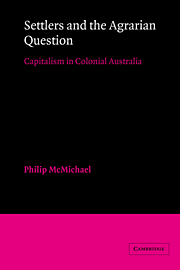Book contents
- Frontmatter
- Contents
- List of tables
- Preface
- 1 The social structure of British hegemony
- PART I THE COLONIAL ECONOMY ENTERS THE WORLD MARKET (1788–1830)
- PART II THE SQUATTING PHASE OF PASTORALISM (1830s AND 1840s)
- PART III CONFRONTING THE AGRARIAN QUESTION (1840–1900)
- APPENDIXES
- 1 Selected land purchases from the county register, 1831–1835
- 2 Differentiation among squatters by land possession and stock, 1844
- 3 Statement showing the difference between convict and free labor
- 4 Wool exports from New South Wales, 1822–1849
- 5 Statements concerning profitability of pastoral enterprise, 1842 and 1844
- 6 Letter (draft) to Henry Dangar, squatter, from R. Campbell Jnr. and Co., Sydney, 1840
- 7 Correspondence: Edward Curr to Niel Black, 1847
- 8 Memo of English capitalists on behalf of squatters, 1845
- 9 Memo from London merchants concerning pastoral labor supply, 1847
- 10 Memo regarding wire fencing, by Jesse Gregson
- References
- Index
7 - Correspondence: Edward Curr to Niel Black, 1847
Published online by Cambridge University Press: 18 December 2009
- Frontmatter
- Contents
- List of tables
- Preface
- 1 The social structure of British hegemony
- PART I THE COLONIAL ECONOMY ENTERS THE WORLD MARKET (1788–1830)
- PART II THE SQUATTING PHASE OF PASTORALISM (1830s AND 1840s)
- PART III CONFRONTING THE AGRARIAN QUESTION (1840–1900)
- APPENDIXES
- 1 Selected land purchases from the county register, 1831–1835
- 2 Differentiation among squatters by land possession and stock, 1844
- 3 Statement showing the difference between convict and free labor
- 4 Wool exports from New South Wales, 1822–1849
- 5 Statements concerning profitability of pastoral enterprise, 1842 and 1844
- 6 Letter (draft) to Henry Dangar, squatter, from R. Campbell Jnr. and Co., Sydney, 1840
- 7 Correspondence: Edward Curr to Niel Black, 1847
- 8 Memo of English capitalists on behalf of squatters, 1845
- 9 Memo from London merchants concerning pastoral labor supply, 1847
- 10 Memo regarding wire fencing, by Jesse Gregson
- References
- Index
Summary
7 July, 1847
Niel Black, Esq.
My dear Mr. Black,
I did not receive…
I have said it twice, and I need not say, with (just pleasure) and interest, that I am wiser for this reading. I agree with its conclusions, that the minimum price of land is far too high, and that (most) costs arise from labour coming upon us in large and (uncertain) masses … exceeded by still greater (dearths). This latter cost I always think will be best assisted by borrowing on immigration fund on (ten percent) of the lands, and the instalments of the fund so borrowed would be called for and expanded in immigration in amounts proportional to our average (requirements), and not to the chance sales of any one year.
But I suggest to you to reconsider a very important branch of your argument, namely that “the sale of waste lands is mainly a medium (scale) use of () to abstract the capital of the Colony.” Now it always appears to me that the sale of waste land abstracts the Capital of Great Britain, for when the chain Sales of Land and immigration is set in motion, each producing the other as cause and effect, capitalist immigration always goes hand in hand with it, and if you could analyse the proceedings of the years of prosperity, (so called) you would find that we imported cons. more capital than the absl. amount, large as it was, that we paid for land.
- Type
- Chapter
- Information
- Settlers and the Agrarian QuestionCapitalism in Colonial Australia, pp. 268 - 269Publisher: Cambridge University PressPrint publication year: 1984



